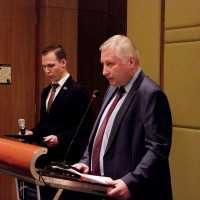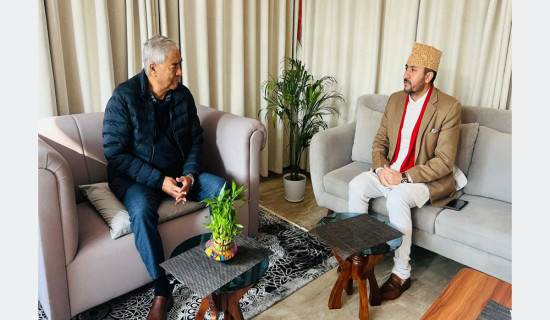- Friday, 26 December 2025
China's exemplary role in fight against transnational wire fraud
Fang Luo and Yumeng Li
Relying on the
rapid development of the Internet and communications technology, and taking
advantage of the loopholes that make it difficult to interface between the
legal systems of different countries, the number of transnational
telecommunication network fraud cases has increased dramatically in proportion
to the number of cases of Internet crime in China.
Transnational wire fraud has not only brought huge economic losses to China, but also seriously infringed on the property security and even life safety of the general public. In fact, China is not the only victim of transnational wire fraud, the Philippines, Cambodia, Vietnam and other Southeast Asian countries have become hot spots for telecom fraud in recent years. Because these countries tend to have relatively lax legal regulation, they have become the main implementation of transnational telecommunication fraud. Some African countries have also been affected by transnational telecommunication fraud, and many of them have defrauded individuals and enterprises in African countries by means of false identity and investment fraud. The United States, Australia, Canada and other countries have also frequently reported being victimised by telecommunication fraud from overseas. Thus, transnational telecommunication fraud has become a global problem, with a wide range of negative impacts on the affected countries, and requires joint efforts of the international community and the adoption of multifaceted measures to deal with it.
China is one of
the major victims of transnational telecommunication fraud. The serious
proliferation of transnational telecommunication fraud has had a negative
impact on Chinese society, its people and its national image.
On the one hand,
transnational telecommunication fraud has, to a certain extent, undermined
China's social order and public trust in the justice system. It not only
violates the property security and even life safety of individuals, but also
undermines mutual trust and honesty, the basis of the social contract. The
long-standing problem of transnational telecommunications fraud has weakened public
confidence in electronic trading platforms and lowered the level of trust in
social interactions, which in turn affects the accumulation of social capital
and the efficiency of social collaboration. On the other hand, in the context
of globalisation, the transnational nature of telecommunication fraud poses a
challenge to China's image in the international community. Frequent incidents
of transnational telecommunication fraud have not only tarnished China's image
as a safe and trustworthy international partner, but have also affected the
foundation of trust in the areas of international business, investment, and
scientific and technological cooperation. Under such circumstances, the Chinese
Government has not only stepped up its efforts to combat telecommunication
fraud domestically, but has also demonstrated its determination and ability to
actively participate in international governance and strengthen transnational
law enforcement cooperation in the international arena, with a view to
safeguarding the country's image and promoting international cooperation.
The difficulties
in combating transnational telecommunication fraud are centred on difficulties
in obtaining intelligence and data between countries, uneven technology and
resources, differences in laws and jurisdictions, and obstacles to
international cooperation. First, effective combating of telecommunications
fraud requires accurate and timely intelligence and data support. However, the
data involved in transnational fraudulent activities are often scattered in
different countries and regions, and obtaining such information requires
transnational cooperation, a process that may be restricted by privacy
protection laws, thus increasing the difficulty of intelligence gathering.
Secondly, telecommunication fraud criminals use high-tech means, such as
virtual private networks (VPNs), encrypted communications and online
anonymisation tools, to hide their true identities and geographic locations.
There are differences in technology and resources between different countries,
and transnational tracking and location capabilities are uneven. Again,
differences in legal systems, regulations, and varying definitions and
penalties for wire fraud between countries make transnational investigations
and prosecutions a major challenge. In addition, jurisdictional issues make it
difficult to determine which country will impose legal sanctions, even if the
offence is detected. Finally, effectively combating transnational wire fraud
requires close cooperation between countries, including information sharing,
joint investigations, and extradition of suspects. However, due to differences
in diplomatic relations, political considerations, legal systems and
operational procedures, international cooperation is often difficult to achieve
the desired efficiency.
China has a
strong will to combat transnational telecommunication fraud, and with a
far-reaching strategic vision, it has not only taken a series of rigid measures
at the domestic level, but has also demonstrated great commitment and wisdom in
the international arena. The Chinese government has not only deepened law
enforcement cooperation with neighbouring countries, but more importantly, has
actively built a platform for multilateral cooperation, which has greatly enhanced
the overall ability to combat telecom fraud in the region by providing a series
of public products, such as technical support, intelligence sharing and
personnel training.
First, through
this mechanism, the intelligence shared covers key data such as the identity
information of suspects, specific crime patterns, and the flow of funds, thus
providing member States with a comprehensive perspective to reveal and
deconstruct the complex structure of criminal networks. In addition, the
intelligence-sharing mechanism has not only facilitated the flow of technology
and information among member States, but also deepened the understanding and
prediction of crime trends.
Secondly, China
has provided technical support and capacity-building assistance to neighbouring
countries to help them enhance their ability to combat telecommunications
network fraud. Through the delivery of advanced investigative equipment,
software tools and customised training courses to the cooperating countries,
the technical investigative capabilities of the police forces of the target
countries and the efficiency of case processing have been significantly
enhanced. Again, China promotes coordination with neighbouring countries at the
legal and policy levels in order to form a united front against transnational
telecommunications fraud. China has not only advocated the spirit of the
international rule of law conceptually, but has also been specifically involved
in the construction of the legal systems of cooperating countries, assisting in
formulating, revising and perfecting a series of laws, regulations and policy
guidelines on telecommunication network fraud.
In addition,
China has committed itself to building and improving a transnational crime
rapid response and case handling mechanism, which not only improves the
immediate response capacity of member countries to transnational
telecommunication fraud incidents, but also enhances operational synergies
among countries in the areas of law enforcement, case investigation and fund
tracing. Finally, China, in cooperation with neighbouring countries, has
carried out a series of activities in public awareness and education aimed at
raising people's awareness of and ability to prevent telecommunication network
fraud. Basic knowledge, recognition techniques and preventive measures against
telecommunication network fraud have been popularised among the general public,
so as to systematically raise the people's security awareness and
self-protection capabilities. Using the extensive coverage of the media, the
instantaneous dissemination of the Internet and the close ties of the
community, a safety and protection network involving all people has been
constructed to strengthen society's overall resistance to telecommunication
network fraud. China has also made use of international platforms and
agreements such as the UN Convention against Transnational Organised Crime, the
China-ASEAN Memorandum of Understanding on Cooperation in the Field of
Non-Traditional Security and its Plan of Action to deepen cooperation with
Thailand, Myanmar and Laos in jointly combating cross-border wire fraud, and to
set up a comprehensive coordination centre for special operations,
demonstrating the enthusiasm of the four countries in jointly combating
cross-border wire fraud, initiative and creativity.
By providing
these public goods, China has not only strengthened its cooperation with
neighbouring countries in combating transnational telecommunication network
fraud, but has also helped those countries to improve their own public security
management and law enforcement capabilities, and to jointly maintain regional
security and stability. These actions by China have not only helped to curb the
high incidence of telecommunication network fraud crimes, but also effectively
safeguarded the property safety and legitimate rights and interests of the
people, and this mode of cross-border cooperation has contributed to the
security of telecommunication networks in neighbouring countries and even
globally.
Through these
efforts, China has demonstrated its image as a responsible power in the
international community, while also providing valuable experience and reference
for other countries. It not only reflects China's sense of international
responsibility in the areas of maintaining cybersecurity and combating
transnational crime, but also highlights the important role of Chinese wisdom
in solving global problems, providing valuable experience and reference for the
international community. In the process, China has demonstrated its
responsibility and commitment as a world power, further enhanced its national
image, deepened its friendly and cooperative relations with neighbouring
countries and contributed to the building of a community of shared future.
( Luo Fang: Researcher, Kunming
Frontier Information Research Centre, Li Yumeng: Researcher, Southwest University of Political Science and
Law Baize Strategic Research Institute)









-original-thumb.jpg)






